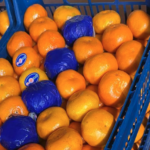U.S. trade expert urges EU compromise in TTIP pesticide talks

Non-tariff barriers have always been a hot topic in agricultural trade negotiations between the U.S. and the European Union, and the Transatlantic Trade and Investment Partnership (TTIP) is proving to be no exception. During the Produce Marketing Association (PMA) Fresh Summit held in Atlanta last month, DTB Associates founder Craig Thorn expressed his hopes for the EU to change its approach to maximum residue limits (MRLs). However, even if U.S. bargaining position is successful the industry will still have to contend with the stricter policies of European retailers.
Compatibility was Thorn's catchcry during the workshop session 'Beyond the Acronyms: Trade Agreements, Global Opportunities & You', where he highlighted tariff cuts were not much use without workable pesticide rules. 
"There are a lot of people in Europe who are complaining that the U.S. has as its negotiating objective, lower food safety standards in Europe. I can tell you that's certainly not the way the U.S. regulators view it," Thorn told workshop participants.
"How do we regulate pesticides in a way that's most effective in ensuring consumer safety? It's not to take a hazard-based approach that's out of step with the rest of the world."
He told www.freshfruitportal.com pesticide regulation was not just about looking at a chemical's intrinsic properties, but exposure and potency.
"That's all part of the formula. U.S. regulators say what you're doing in Europe is not more protective of health or the environment than what we're doing," he said.
"What we're doing is more protective because we do a scientific calculation that takes into account all relevant factors.
"The EPA (Environmental Protection Agency) would say, 'no, we're asking you to raise your standards by basing your decisions on a proper set of factors'. And I think that they’re very determined to crack that problem."
Thorn, who spent 15 years at the U.S. Foreign Agricultural Service (FAS), said a lot of European producer groups were concerned about the effect new legislation could have on productivity.
"The funny thing is this legislation I'm referring to has been in place since 2009 but you haven't seen too many effects because the European-wide registrations were done in 2006-08." he said.
"Those are 10-year registrations that are just now beginning to expire so you haven't seen much of the effect yet on European production or on trade, but it's going to hit sometime soon.
"What they're [negotiators] anxious to do is avoid the consequences for commodity trade that could result from European producers losing access to those chemicals."
He added the TTIP included a separate sectoral negotiation on pesticides to help bridge the gap between the EU and U.S. approaches to MRLs.
"They're getting all the regulators in the room, and they're seeing to what extent there is the possibility for discussing the differences in the regulatory push but also setting up mechanisms for regulatory cooperation, the sharing of data, the sharing of risk assessments and so forth."
Netherlands-based Fresh Produce Centre director Gert Mulder agreed that policy differences on pesticides, as well as food safety, needed to be negotiated to make trade easier.
"With pesticides it's the rule that if you have a standard MRL set then everybody can deal with it, but if you have a pesticide that isn't used in the EU for example, there is no standard.
"So they they set the lowest of low standards and you go through a lot of cost and a lot of bureaucracy to get a limit set that is terrible for your production.
"I think we're dealing with a thing that everybody wants and needs."
European Fresh Produce Association (Freshfel) food quality director Eglė Eimontaitė told www.freshfruitportal.com harmonization was certainly a tool that could facilitate international trade, but addressing produce issues between the EU and the U.S. needed a multi-faceted approach.
"Negotiations like TTIP offer opportunities to approximate the legislation of the different parties and this should be welcomed. Certainly a wide range of issues should be in the agenda of an ambitious FTA [free trade agreement] like TTIP. However, the route will not be without hurdles," she said.
"The biggest challenge of the negotiators in the area of MRL will be to find the right balance between food safety and consumer safety.
"Indeed, the EU pushed by NGO, civil society and consumers has probably today one of the stricter legislation in regard to registration of active substances and setting of MRLs."
Eimontaitė said these requirements were further enhanced by retailers which imposed even stricter rules than the ones set in the EU legislation.
"This debate therefore has multiple aspects which might go beyond a mere regulatory harmonization process. Expectations of European consumers will remain high in this respect.
"Looking at the issue from both directions, the negotiations might also be an opportunity for the USA to endorse some of the EU regulatory requirements and agriculture practices which could increase the confidence in the safety of fresh produce for both the EU and US consumers."
She added the harmonization in trade debate should not be limited to MRLs, pointing to several other non-tariff barriers in need of discussion.
"The U.S. plant health requirements remain for many European exporters a significant hurdle to trade.
"The pilot project of the European Commission on a plant health protocol on behalf of several EU MSs [member states] and APHIS (Animal and Plant Health Inspection Service) for apple and pear commodities was launched in 2009.
"The plant health protocol is supposed to allow exports from several EU MSs under a system approach rather than on the basis of a costly pre-clearance system. However the progress is very limited."
Photo: www.shutterstock.com












































